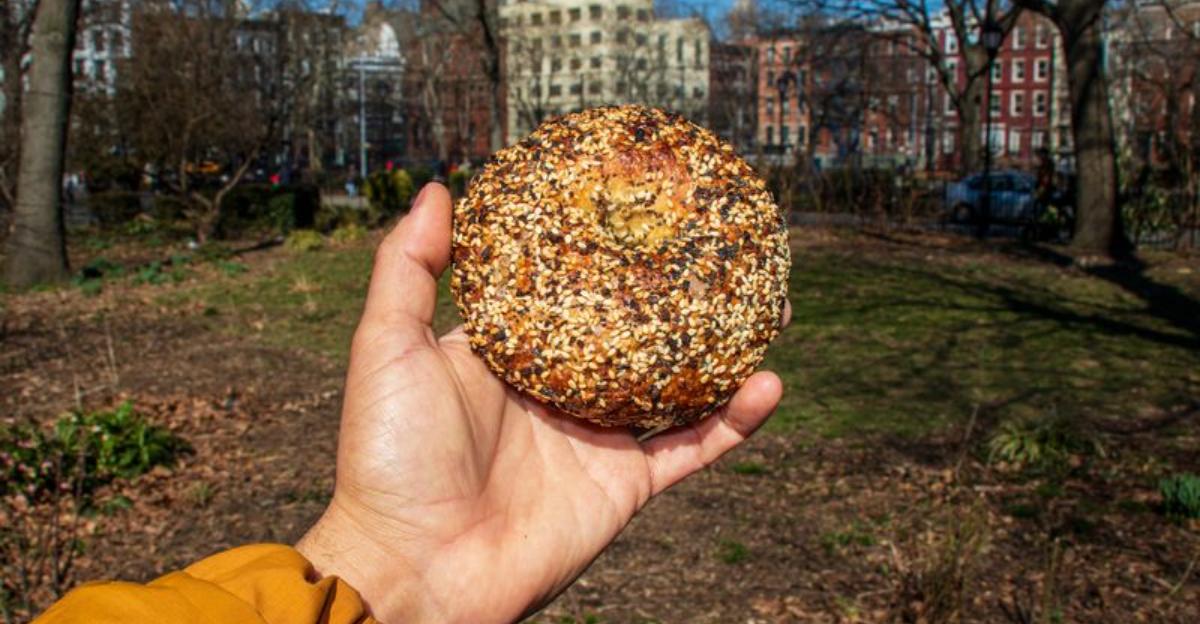12 Real Reasons New York Bagels Will Always Be The Best

Nothing beats biting into a fresh New York bagel – that perfect chewy inside with a slightly crisp exterior is pure magic in your mouth.
As a born-and-raised New Yorker, I’ve spent countless Sunday mornings queuing up at my neighborhood bagel shop, impatiently waiting for my everything bagel with scallion cream cheese.
The superiority of our bagels isn’t just local pride talking – there’s actual science and tradition behind why these doughy rings reign supreme.
1. The Secret’s In The Water
My cousin from Arizona once tried to replicate my grandmother’s bagel recipe and failed miserably. “What am I doing wrong?” she wailed over the phone. The culprit? Her desert tap water.
New York’s water contains naturally low levels of calcium and magnesium, creating a softer water profile that affects gluten development in the dough. This magical liquid flows from the Catskill Mountains through one of the largest unfiltered water systems in the world.
The mineral composition gives our bagels that distinctive chewiness and crust that out-of-state imitations can’t match. Some bagel shops in other states even import New York water or use chemical treatments to mimic our water’s profile – talk about dedication!
2. Cold Fermentation Magic
Last winter, I shadowed a bagel maker at my favorite shop who showed me their walk-in refrigerator filled with hundreds of bagel dough rings. “These babies need to sleep overnight,” he winked.
Traditional New York bagel-making involves slow cold fermentation, where dough rests in refrigeration for 24-48 hours. During this chilly slumber party, magic happens as yeast slowly produces carbon dioxide and flavor compounds develop complexity.
The prolonged fermentation creates those tiny air pockets giving bagels their perfect texture and subtle sourdough undertones. Quick-rise methods used by chain bakeries simply can’t compare to this patient process. Time, as it turns out, really is the secret ingredient.
3. The Boil-Before-Bake Technique
“Throw ’em in the jacuzzi!” shouted the head baker at Ess-a-Bagel when I visited their kitchen for a food blog piece. The theatrical boiling step before baking isn’t just for show – it’s chemistry in action!
Dunking the dough in boiling water gelatinizes the starches on the exterior, creating that shiny, chewy crust New York bagels are famous for. The brief hot tub soak (usually 30-60 seconds per side) sets the shape and creates a moisture barrier that affects how the bagels later expand in the oven.
Many non-New York establishments skip this crucial step, using steam-injection ovens instead. Blasphemy! Without the boil, you’ve just got a round bread with a hole – not a true bagel.
4. Malty Goodness In The Boil
“See that brown stuff?” My uncle Morty pointed to a container next to the boiling kettle during my first job at his Brooklyn bagel shop. “That’s our secret weapon.” The amber liquid was barley malt syrup – the unsung hero of authentic New York bagel production.
Adding malt to the boiling water contributes to the bagel’s distinctive flavor and helps achieve that gorgeous caramelized exterior. This sweet, earthy syrup activates enzymes that break down starches into simple sugars, creating the perfect canvas for browning during baking.
Many mass-produced bagels use cheaper alternatives like sugar or honey, or skip this ingredient altogether. The malt’s subtle complexity is something your taste buds might not identify specifically, but would certainly miss if it weren’t there.
5. New York’s Unique Terroir
Walking through Greenwich Village one morning, I caught the unmistakable aroma of bagels baking and followed my nose to a tiny shop. The owner laughed when I asked about his recipe: “Honey, it wouldn’t taste the same anywhere else anyway.”
Like fine wine, bagels have their own terroir – the environmental factors affecting their taste. New York’s specific combination of air quality, ambient yeast, humidity levels, and altitude creates conditions impossible to replicate elsewhere.
The city’s atmospheric pressure and moisture levels affect how dough rises and crusts form. Even the microorganisms floating around in century-old bakeries contribute to flavor development. Some bakers swear their shops’ walls have absorbed decades of bagel-making wisdom that subtly influences each new batch.
6. Generations Of Bagel Craftsmanship
Mr. Goldstein, my childhood bagel shop owner, had hands so nimble they seemed to dance as he shaped dough into perfect rings. “My father taught me, his father taught him, and now I’m teaching my daughter,” he’d say with pride.
Many New York bagel shops boast bakers with decades of experience, often trained through family apprenticeships where techniques are passed down through generations. These artisans develop an intuitive feel for the dough that no recipe can teach – knowing exactly when it needs more kneading or when it’s ready to rest.
Their experienced hands shape each bagel with consistent precision, achieving that ideal hole-to-dough ratio. This human touch creates subtle variations that mass production can never replicate, making each bagel a unique work of edible art.
7. Fierce Competition Breeds Excellence
“Three new bagel shops opened on my block last year,” my sister complained over brunch. “But honestly, only one survived because New Yorkers know the real deal.” Nothing mediocre lasts long in this city.
The cutthroat bagel scene in New York creates a natural selection process where only the truly exceptional survive. With dozens of shops competing within walking distance of each other, bagel makers must maintain impeccable standards or risk losing their customer base overnight.
This competitive environment forces continuous improvement and unwavering consistency. Bagel shops can’t coast on reputation alone – they must deliver excellence with every batch or watch customers flock to the competitor down the street. This relentless quality pressure simply doesn’t exist in areas with only one or two bagel options.
8. High Volume Equals Peak Freshness
The line at Absolute Bagels stretched around the block last Saturday morning. My friend from Chicago complained about the wait, but I just smiled knowingly. “Trust me, it’s worth it.”
New York bagel shops sell hundreds – sometimes thousands – of bagels daily, meaning what you’re buying was likely made just hours ago. This rapid turnover ensures peak freshness that slower-selling establishments simply can’t match.
Many NYC shops bake continuously throughout the day rather than making one big batch in the morning. The bagel you get at 2 PM might still be warm from the oven! This constant production cycle means shorter shelf time and minimal need for preservatives or freshness-extending techniques that compromise flavor and texture.
9. High-Gluten Flour Power
I once brought my favorite bagel shop owner a bag of regular all-purpose flour as a gift. He laughed so hard he nearly choked on his coffee. “Kid, that stuff’s for birthday cakes, not real bagels!”
Authentic New York bagels require high-gluten flour with protein content around 14-15% – significantly higher than all-purpose flour. This special wheat creates the strong gluten network responsible for that characteristic chewy texture and structural integrity.
The extra protein forms longer gluten strands during mixing and kneading, giving bagels their substantial bite and distinctive mouthfeel. Many non-New York bagels use lower-protein flour that produces a softer, bread-like texture rather than that gloriously chewy resistance that makes your jaw work just the right amount.
10. Old Pipes, Great Bagels
My plumber uncle has a wild theory that makes surprising sense: “Those ancient pipes under Manhattan? They’re seasoning our water like cast iron skillets season food.” He might be onto something!
New York City’s aging water infrastructure – with some pipes dating back to the 1800s – may actually contribute to our bagels’ distinctive flavor. The system’s century-old cast iron pipes potentially impart subtle mineral notes to the water flowing through them.
While modern water treatment ensures safety, these pipes create a unique mineral profile that newer systems in other cities lack. Some bagel experts theorize that this “pipe terroir” adds complexity to the water that affects fermentation and flavor development. It’s a happy accident of infrastructure that might be impossible to intentionally replicate.
11. The Perfect Canvas For Creativity
“What’ll it be today?” asks Sal at my corner bagel shop, already reaching for an everything bagel before I answer. The man knows my Sunday order by heart, but on Wednesdays, I always try something different.
The sturdy structure and neutral base flavor of New York bagels make them the perfect foundation for both traditional and innovative toppings. Their substantial chew stands up to heavy schmears without getting soggy or falling apart, unlike their flimsy counterparts elsewhere.
From classic combinations like lox and cream cheese to modern creations featuring truffle-infused spreads or Korean-inspired toppings, the authentic New York bagel provides the ideal canvas. Its structural integrity and balanced flavor complement rather than compete with whatever delicious additions you choose to pile on.
12. Deeply Ingrained Cultural Tradition
My grandmother still tells stories about buying hot bagels for a penny as a girl on the Lower East Side. “The man would string them on a stick for you to carry home,” she reminisces, her eyes twinkling.
Bagels aren’t just food in New York – they’re cultural institutions woven into the city’s identity. Brought by Jewish immigrants in the early 20th century, bagels evolved from ethnic specialty to universal city staple that transcends all demographic boundaries.
This deep cultural embedding means bagel-making is treated with reverence and respect for tradition. New Yorkers grow up with strong opinions about bagels and pass these standards down through generations. The emotional connection creates a quality-control army of millions who would loudly protest any decline in standards – ensuring our bagels remain forever superior.
